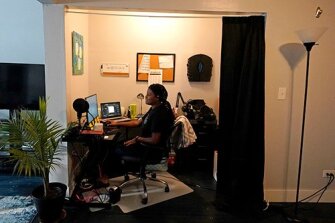
Several months into the new school year, the question remains: Is remote learning going better this fall than it was in the spring?
New data from the RAND Corporation show that many teachers are still struggling.
Teachers in all-remote environments reported higher student absenteeism and less student work completion than teachers in face-to-face classrooms. These online teachers also said that they needed more support and guidance in planning instruction than their colleagues who were teaching in-person.
These results are especially relevant right now, as COVID-19 cases are surging across the country, and several big-city school districts are weighing a return to fully remote classes.
“From this data that we’ve collected, it’s clear that there are some students who are very likely falling through the cracks because of remote learning,” said Julia Kaufman, a senior policy researcher at the RAND Corporation and a co-author of the report, in an interview with Education Week.
RAND 1,082 teachers and 1,147 school leaders from the organization’s American Educator Panels in October, asking about their experiences during the 2020-21 school year so far.
The results cover a wide swath of issues, from teacher morale to substitute shortages to technology access. But the data on instruction, specifically, hint at the pandemic’s long-term effects on student learning.
Slower Pace of Learning
Classes are not proceeding at the usual pace, the report found:
- Two-thirds of teachers said that the majority of their students were less prepared for grade-level work than they were at this time last year
- 56 percent of teachers said that they had covered only half, or less than half, of the curriculum content that they would have gotten to by this time last year
- Only about 1 in 5 teachers said that they were on the same schedule as years past
Teachers in remote and hybrid environments reported more challenges than those in solely face-to-face instruction.
Absenteeism has been a persistent problem this fall across all learning modalities, as Education Week has reported. But teachers in the RAND survey who were working in person said that their students showed up more consistently:
- In-person teachers said 91 percent of their students were present every day
- Hybrid teachers reported 85 percent of their students attended daily
- Teachers who were fully remote estimated 84 percent attended daily
Assignment completion varied by learning environment, too. Teachers who were fully in-person said that 82 percent of their students turned in most or all of their work, compared to teachers who were fully remote, who said that only 62 percent of their students did the same.
Some 69��ý ‘More Likely to Be Falling Behind’
Like the Education Week Research Center, RAND found that schools where most of the students qualified for free and reduced-price lunch, and schools that serve majority students of color, are more likely to offer remote learning, rather than in-person classes.
“These are students who are also more likely to be falling behind, less likely to have access to a digital device or the internet. The odds are kind of stacked against them,” Kaufman said.
See also: Fighting for Fairness Amid a Pandemic
Online teachers were more likely to say that they needed guidance on how best to support students with severe disabilities, English-language learners, and students experiencing homelessness or poverty.
They also said they needed more general instructional support—in adapting curriculum, in motivating students, in accelerating them academically, and in assessing their learning—than teachers who are in the physical classroom every day.
Even as they struggle to make remote learning work, teachers still report deep concerns about the virus: 57 percent of teachers said that their health and the health of their loved ones was a major concern right now, and 27 percent said it was a moderate concern.
This picture leaves state and federal governments with a dual imperative, Kaufman and her co-author Melissa Diliberti argue. One, make schools safer to attend in person: Take precautions like universal mask-wearing, and then keep track of which precautions actually work. And two, direct much more funding and support toward making remote learning better.
As EdWeek’s Catherine Gewertz and Stephen Sawchuk wrote earlier this month, schools are making these decisions with incomplete and imperfect information, and often face harsh criticism from community members whether they’re open or closed.
“Regardless, we know that students who are getting remote instruction, especially if they’re in high-minority and high-poverty schools, they need the most support,” Kaufman said.
Image: Chicago charter school teacher Angela McByrd works on her laptop to teach remotely from her home in Chicago. (AP Photo/Nam Y. Huh)
